- Home
- Edmund White
The Married Man Page 2
The Married Man Read online
Page 2
Once or twice in the days that followed his encounter with Julien at the gym, Austin thought of him, but didn’t want to call him. Although a married man could be a sexy fantasy, the reality was just a nuisance—broken dates, whispered phone calls and sudden hang-ups, never a meeting in a public place, unexpected spasms of self-hatred, never a whole night in bed….
And then his confidence had been sapped by his last lover, also named Julien, who’d bewitched him for the last three years until he’d suddenly dropped him two months ago for a rich collector. “Little” Julien, as he called him, since he was small in every way except in one crucial detail, never made a false move. He was worldly and supremely practical but not unkind. He was willing to sleep with much older men in exchange for trips, clothes, dinners, all the small change of sex between the generations. What he brought to the bargaining table was his inestimable gift for imaginative, inexhaustible passion.
Austin had met Little Julien at a cocktail party given by his friend Henry McVay, the seventy-year-old patrician leader of the American expatriate colony. McVay, a Philadelphia millionaire collector who lived surrounded by his Goyas and Cezannes and who’d been in Paris since 1944, when he’d arrived as a soldier, gave an annual bash for prominent couples and cute guys. Little Julien had been one of McVay’s boys, a twenty-four-year-old with a fox face, an intense stare and the strange smell of an old well, as though his fillings had started to rust in an excess of saliva.
At the very beginning Little Julien had accepted Austin’s invitations on three separate occasions, but Austin never dared so much as to kiss him good night or to invite him up for a drink. As he figured it, at his age he mustn’t ever make the first move with a kid, since nine out of ten would regard sex with a middle-aged man as obscene, even criminal, and he, Austin, was incapable of picking out the talented tenth, the blessed exception, that nearly unique boy who admired experience and accomplishment more than an uncreased face and a tympanum-tight tummy. Nor could he spot that one guy in a hundred who was age-blind and didn’t judge another man as a commodity. Of course it was Little Julien who finally jumped him after the third date. As Austin was politely bowing and turning to walk away, Little Julien grabbed him and said, “Don’t overdo it” (Tu exagères), pulled him into his darkened apartment and was soon testing Austin’s gag reflexes, whispering sternly, “All the way to the bottom” (Au fond, au fond).
Now all that was over, the big sunbursts of sex, Little Julien’s fleeting shadows of ill humor, his dull certainty that he would marry a woman someday very soon, his perverse refusal to stay on with Austin at the end of a dinner party. Little Julien always left with the other guests and it was only during a trip together—to London, to Istanbul, to Damascus—that Austin could sleep with him night after night and drink deep at that inexhaustible well of sensuality. Little Julien never gave sex on schedule; once when Austin complained about his unpredictability, he pointed out with inarguable accuracy, “After four years we’re still having sex, which is as exciting as the first time. What other couple could claim as much?” Immediately after the break-up, Austin had been happy to be rid of Little Julien, who had never conceded any warmth or tenderness beyond their initial, rather formal amiability. They were like gentlemen in a Sade novel, with impeccable manners and a bottomless taste for debauchery—fellow practitioners but not buddies, certainly not lovers.
Weirdly, when Little Julien explained why he was leaving he mentioned several things that Austin would never have foreseen. He said that Austin was “too visible” as a homosexual; he could never have felt comfortable associating himself with someone so public about his private life. Then he said Marius, his new lover, was able to fulfill his “affective needs,” which Austin, he implied, had neglected. Austin was shocked, since he’d always thought it was Little Julien who was holding him at arm’s length. Given the first sign of openness, Austin had long been prepared to rush in, eyes melting. Then Little Julien mentioned that he didn’t want to “end up” with a foreigner; he was drawn to Marius because he was French. “If Corsican,” Austin muttered sourly, which only made Little Julien flash a flattered smile: “I see you’ve been collecting information on him.” Or maybe Little Julien wanted a man with some real money. If he was going to invest his youth, his venture capital, it should be in futures with a future.
Or maybe Little Julien was simply afraid of Austin because Austin was HIV-positive.
A week after the break-up Austin began to feel wounded, rejected, lovelorn. Then he suffered terribly, though he knew how stupid he was being. It was only his vanity that was injured, which he readily admitted. If he’d left Little Julien first, he wouldn’t have thought about him twice.
And yet Little Julien was not only the maestro of sex but also a roaring fire of creativity, both artistic and social. He had a fast, funny way of talking, unpretentious, intelligent but not intellectual. He couldn’t sit still long enough to read except on vacations, and even then to read was more an underlined item in a program of repose and self-improvement than anything he ever actually did. Austin liked Little Julien because he was his link with chic young Parisian life, the sudden eruption of drunken laughter heard behind a seventeenth-century portal or a multicolored flurry of many young cockatoos across the dim, windblown magnificence of the Place de l’Odèon. Paris was a city that could seem uniformly austere and melancholy unless you could penetrate the gray shutters and dolly in on the eight candlelit faces flushed with wine around the table or hand the embossed invitation to the wigged footman which would grant you admission to the feathered and ribboned masked ball (how the French loved to dress up as Valmonts and Merteuils!).
Little Julien had been his—well, not his passport into this secret joy, since most of the invitations had been addressed to Austin as a journalist or furniture expert or as just an amusing foreigner, but rather his guest of honor for whom he’d organized dinners at home or with whom he’d “double dated” (since Little Julien would never have gone anywhere public without a woman as his shield). He and Little Julien and their dates were always wearing black tie and gowns, dropping in on a smoky loft party for the Green Negresses or some other punk group of white men. Everyone else was in jeans and settled in, but Austin and Little Julien were always in formal clothes and “going on.” Little Julien, who’d been a lawyer’s clerk, had taken a paid year’s leave of absence to study furniture-making; it was one of those enlightened and unfathomable French perks that were bankrupting the state. He revealed a whimsical talent for designing tables that were amusing used right side up and hilarious when reversed, and for rethinking every element in a dining room from the zodiac ceiling to the star-studded dishes and shooting star napkins.
Now the invitations drifted like the last flakes of snow onto Austin’s mantelpiece and he glanced at them only long enough to decline them. Weeks went by and he saw only a few friends, and then only one at a time for a movie or a quick bite at a neighborhood crêperie. His island seemed suddenly intolerably sad, shrouded in mists that floated up in the day-for-night wake of a nearly empty, winter bâteau-mouche. He crossed the Pont Marie with its empty statue niches looking down on the Seine, black and shiny as mined coal between tourist boats, more and more widely spaced as midnight and the winter solstice drew nearer.
Chapter Three
The phone rang.
“Hello, it’s Julien. We met at the gym.”
“Of course. How nice—”
“Did I awaken you?”
“Awaken me? At… uh … eleven in the morning? Of course not. I’ve been up for hours.”
“I just saw your card in my wallet and I thought I’d see how you were doing. Did you ever go back to that gym?”
“Several times since then. And you?”
“I’ve had too much work.”
“Would you like to come to dinner on Wednesday? A few friends are stopping by. Around nine? But you could come later if your work keeps you.” He gave Julien the buildi
ng code, the numbers that had to be punched in to gain admittance to the street door.
From the precision and care with which he took down all the information Austin knew he would come, which neither thrilled him nor left him indifferent. Julien sounded slightly more eager, even more schoolboyish than he had at the gym, perhaps because being the one who was taking the initiative placed him at a slight disadvantage.
Austin had invited six friends who were in their early thirties, including his “sports professor,” Pierre-Yves, a mad young psychiatrist named Hubert, a hilarious actress called Antoinette, a friendly woman, Isabelle, who worked for the Musée d’Art Moderne de la Ville de Paris, a loud American acupuncturist named Gregg, and one of Austin’s best friends, Joséphine, who wrote and illustrated children’s books. This was a group Austin had cobbled together to keep Little Julien amused. The men were gay and the women straight and everyone loved to drink and joke and exchange stories and have a good time till one in the morning; if they’d been upper-class Parisians they would have left promptly at midnight, but these friends were too inexperienced socially to know of this invariable “rule.”
Austin thought that if Big Julien, this new Julien, was still married and had never lived openly as a gay man, then he’d surely be less spooked by a dinner at which there were three attractive, stylishly dressed women. And everyone was close to Big Julien’s age, which might make him forget that Austin was some two decades older.
For years now Austin had been inviting these young men and women to his apartment every week or two for the evening. Because they were not earning much and were living on snacks, he knew the women liked putting on their best dresses and heels and heavily painting their eyes and lips to head across the Pont Marie to the dim, fog-wrapped splendors of the Île Saint-Louis. The men could be very open about their sexuality and shockingly flirtatious with the girls—behavior that appeared inconsistent, even self-contradictory to American eyes but that Latins, with their love of seductiveness, deemed perfectly natural.
On the phone next day each of them could be a bit bizarre—Joséphine paranoid as usual, Antoinette prudish, even pig-headed, Pierre-Yves hypercritical, Gregg as irritable as someone critically sleep-deprived. But in a group, when they’d drunk lots of wine, they were convivial, outrageous, and above all light—light as only Parisians knew how to be. They argued only about politics. But otherwise no one preached on a pet subject as Americans were wont to do when they weren’t chattering about house remodeling or global warming. If Austin held forth on a topic he’d just been researching there’d be a furious exchange of winks and giggles or they’d all tuck their hands under their arms and lower their heads as though waiting for it to go away. Pierre-Yves had once seen an American movie of the fifties replayed on television, in which teenage hoodlums bedeviled their instructor whenever he started lecturing them by saying, “Gee, thanks, Teach,” and now he would call Austin “Teach,” too, at the first ugly sign of New World didacticism.
Austin had put together this circle to please Little Julien but now he was hoping it would set Big Julien at ease and amuse him, too. Not that everyone liked his friends. “I don’t know what to think, Austin, of your teen evening,” one older man had said the day after a dinner. He was a writer and had wanted, apparently, to talk books and literary prizes and discuss his recent rather stylish conversion back to Catholicism. For a moment Austin had felt foolish for all the hundreds of hours he’d devoted to chopping mushrooms, pouring out good Bordeaux and rolling joints for this band of kids.
His rowdy French friends, he imagined, might be taken aback by the reality of Big Julien’s marriage, for even though they discussed their own bisexuality at length and their conveniently hazy and remote plans to marry one day, they would surely be confused by an attractive young man who was actually living with a wife.
The bell rang. It was Julien with small yellow roses in his hand. “Sorry, I’m early,” he said. “I came right from work.”
“Not at all,” Austin said. He leaned forward to peck him on both cheeks but Julien shook his hand. Julien even smiled with mild satire, as if to say that he, at least, was too virile, too “old France” (vieille France) to kiss any man other than his father and brother. Austin steered him in with a friendly hand just grazing his back, his face impassive, as though he hadn’t registered the minute rejection. Strangely enough, Little Julien had also disliked all these pecks (bises) among men, which he’d seen as effeminate Parisian insincerity. When Austin came back from the kitchen with the flowers in a vase and a glass of wine for his guest, he saw Julien standing by the window looking out. “What do you think of my parish church?”
Julien turned eagerly and seemed almost disappointed by the ironic smile on Austin’s lips. It was obvious that as an architect he was impressed by the massive, twisting stone volute.
Austin said, “Not that I’m a Catholic. Are you?”
Julien said, “Atheist. I’m from a long line of atheists on both sides. I just admire the force of the roof.” He took the wine and seated himself in the chair Austin indicated. Julien was wearing an unbecoming pear-green linen blazer, double-breasted, with gold buttons that were too heavy and tugged at the thin fabric. The color was all wrong for his complexion—he looked sallow, oily, tired.
“I’m an atheist, too,” Austin said. “I hate it when people say they’re agnostics, don’t you? It’s so weak-kneed.” He almost added, “Especially gays, the pathetic nitwits, who’ve been tortured and insulted by every known religion,” but he directed his thoughts away from that dangerous subject, which might seem glib to Julien and not evoke the same associations for him. Austin was already sure that Julien was an individualist, as opinionated as he was unpredictable, and that his beliefs must be pieced together carefully. Maybe he didn’t even use the word gay. Maybe he didn’t even think that word. Maybe he was one of those men, like Lohengrin, who loved you only so long as you didn’t name them.
“I know nothing about religion,” Julien said with that sort of sweet gravity men use when they admit to a shortcoming they don’t take seriously.
He went off to wash his hands—and face, Austin noticed, since he came back with a nose and forehead visibly less oily. Not that Austin minded physical imperfections now. On the contrary, he found them reassuring, as though they were credits that offset the huge overdraft he had run up by allowing himself to get so old. When he’d been young and appealing, Austin had used someone’s slightest fault as a reason to reject him, just to weed out the ranks of admirers. But even then his natural inclination had been to respond to anyone who liked him, and now that there were so few men who even looked at him as a sexual being he could respond to them all with equal enthusiasm. In fact, he’d been so afraid of dressing too young or touching up his hair, which was beginning to gray, that he always wore suits and had even exchanged his contact lenses for donnish glasses, thereby thickening the erotic distance between himself and other men. Maybe it was only those who dreamed of punishing Daddy or of finally becoming teacher’s pet who were pulled toward him.
Big Julien, he could see, now that he had him once again before his eyes and could study him, was handsome if not exactly his type. But did he, Austin, even have a type now? He used to say that he fell in love with blonds but lusted after brunets. But in recent years he’d slept with so many different kinds of men, and sometimes, unexpectedly, kindled to their unfamiliar touch, that more and more often he’d look at the least likely man and think, Maybe him? Maybe he could make me feel good? For in sex he was now less interested in a trophy-boy and more attracted to the man who might bring him pleasure. He wanted pleasure, not prestige.
While he ran around with drinks and canapés the other guests arrived. He was delighted to see how effortlessly Big Julien fitted into this group despite the difficulty of everyone else already knowing one another. Or rather Julien appeared almost indifferent to fitting in. He was kindly, polite, smiling but dignified, and he seemed olde
r than the other guests, as though he were a soldier back from the front among kids too young to have fought—or in fact, what he was, a married man.
Unlike Americans, French guests all smoked, drank red wine, ate red meat and white rice, white bread and white sugar. They had almost no food dislikes except white wine or sweet things (such as cranberry sauce) served before the dessert course or fiery spices offered no matter when. Salsas and curries were not acceptable. Garlic could be a problem anywhere north of the Loire.
Austin served his guests a first course of smoked fish and salad in a mustard vinaigrette and a second of lamb shoulder stewed with onions, tomatoes and white beans. Then he passed around a big smelly platter of oozing cheeses, though privately he knew that chalky goat cheeses dusted in cinders were more “distinguished” than these runny Bries and Camemberts, and that skipping the cheese course altogether was still more aristocratic, but he also recognized that he had to fill his skinny young guests up. For dessert, like all Parisians, he bought bakery sweets, since no one in his own kitchen could rival the layered and unidentifiable mousses that the French admired (and Americans dismissed as “synthetic”). Then there were petit fours served with the coffee and chocolate-covered coffee beans and truffes, those dense, bitter balls of cold butter and cocoa, as if the table would be declared indecent were it left undressed even for an instant. Austin liked the formula he’d worked out here at home of formal food and dressy attire in a cozy, broken-down apartment at the chic-est address, an event attended by high-spirited kids with unleashed tongues, high aspirations and a dawning worry about whether, just now, that bowl was for washing the fruit or their fingers. Oh, he was all for making them talk freely and volubly but he didn’t want them to forget that tonight, like all the other nights here, was some sort of occasion. Since he never led the conversation (he was running back and forth from the kitchen too often and besides his French wasn’t agile and funny enough), he needed to impose his personality through what the French called “the arts of the table.”

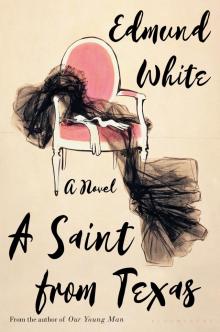 A Saint from Texas
A Saint from Texas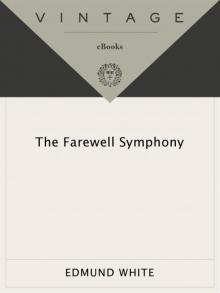 The Farewell Symphony
The Farewell Symphony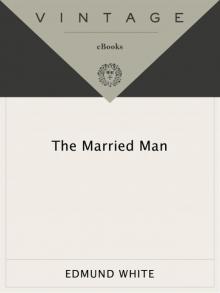 The Married Man
The Married Man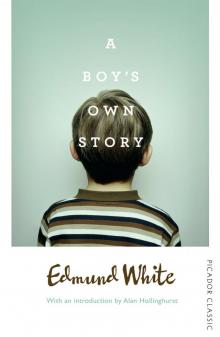 A Boy's Own Story
A Boy's Own Story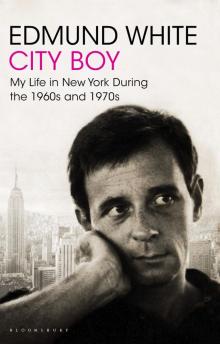 City Boy
City Boy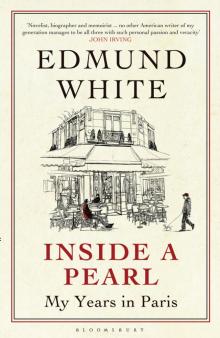 Inside a Pearl
Inside a Pearl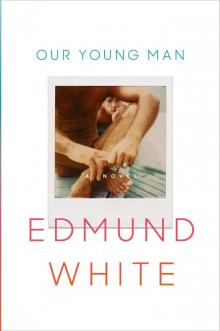 Our Young Man
Our Young Man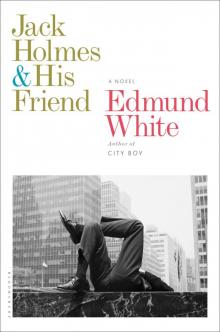 Jack Holmes and His Friend
Jack Holmes and His Friend